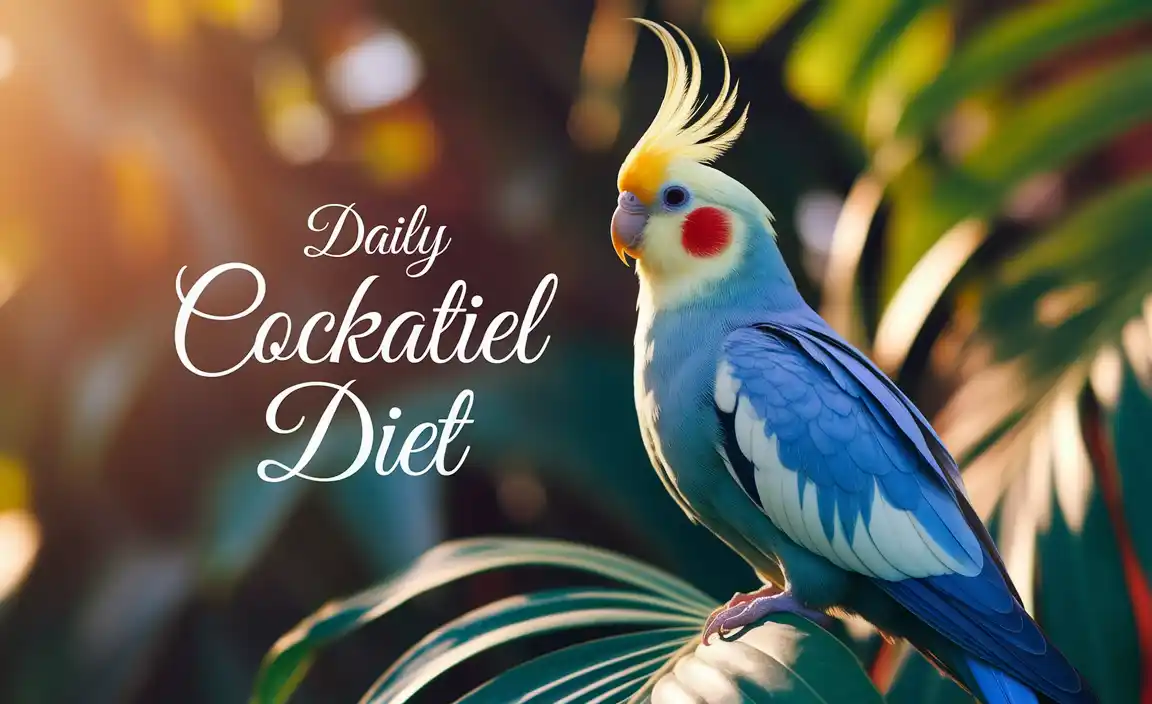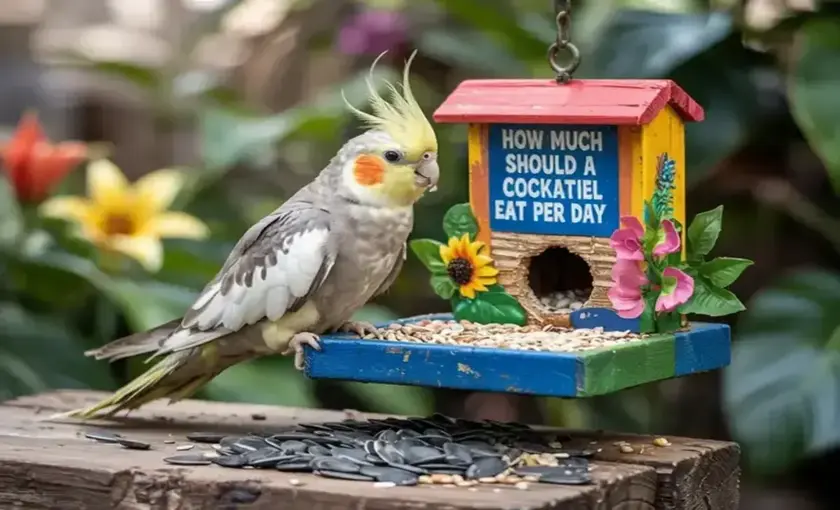Have you ever wondered if your cockatiel eats the right amount each day? These feathery friends can be quite picky. Imagine discovering that your pet bird, so small and lively, actually eats less than you thought! Many people think their cockatiel needs endless seeds, but is that true?
Let’s think about a cockatiel’s day. From dawn to dusk, they chirp, flap around, and explore. This activity needs fuel, right? But how much food is just right? Too much and they might gain weight. Too little and they’ll feel sluggish. Finding the perfect amount is key to keeping them happy and healthy. So, what’s the magic number for a cockatiel’s meal? Let’s explore it!

How Much Should a Cockatiel Eat Per Day?

Ever wondered if your cockatiel is eating the right amount? These friendly birds need about 1.5 to 2 tablespoons of seeds and pellets each day. Fresh fruits and veggies make a nice treat and should also be included. Watching your cockatiel’s weight and adjusting food helps keep it healthy and cheerful. Did you know? Just like humans, every bird has unique needs. So, tune in to your pet’s appetite and adjust accordingly.
Nutritional Needs of Cockatiels
Understanding the basic dietary requirements. Importance of a balanced diet.
Cockatiels need a balanced diet to stay healthy. They eat seeds, fruits, and veggies. **A cockatiel’s daily food intake** should be measured to keep them fit. Seeds are okay but add pellets and fresh foods too. Pellets have essential nutrients that strengthen them. Here’s how to ensure your bird eats well:
- **Seeds**: Less than 50% of their diet.
- **Pellets**: About 30%-40%.
- **Fresh Foods**: Make up the rest. Offer fruits and veggies.
Provide clean water daily. Monitor the food to see they are eating right. A well-balanced diet boosts their mood and energy!
Can Cockatiels eat too many seeds?
No, too many seeds can harm them. Seeds have fats. A diet high in seeds can lead to obesity and other health issues. Add fruits and vegetables to balance things out.
Daily Feeding Guidelines for Cockatiels
Recommended portion sizes. Frequency of meals.
Feeding a cockatiel is easy once you know the basics. They should eat about 1.5 to 2 tablespoons of seeds or pellets daily. Fresh fruits and veggies make great treats, too! Cockatiels like to eat several times a day.
- 1/2 tablespoon of seeds in the morning
- 1/2 tablespoon of seeds in the evening
- Small fresh produce portions throughout the day
Remember to provide clean water and remove uneaten food to keep them healthy.
How often should cockatiels eat?
Cockatiels need food twice a day. Morning and evening are great times to feed them.
Should I give my cockatiel snacks?
Yes, offer safe fruits and veggies as snacks, but avoid too much, as these are treats, not main meals.
Essential Components of a Cockatiel’s Diet
Pellets vs. seeds. Fresh fruits and vegetables. Additional supplements and treats.
Feeding your cockatiel well keeps it healthy. Pellets are balanced and good for their main diet. Seeds are okay but not as healthy if eaten too much. Cockatiels love fresh fruits and vegetables like apples or carrots. These foods give them vitamins that are homemade. Here’s a tip: give them cooked eggs sometimes for protein. Treats like millet should be rare, not daily. Too much sugar or salt is bad for them, just like us. Give them clean, fresh water every day. A healthy diet means a happy bird!
Do pellets or seeds make up most of a cockatiel’s diet?
Pellets should make up most of a cockatiel’s diet. They are balanced and have all the nutrients needed. Seeds can be a part, but not the main part. Seeds do not have all the vitamins like pellets do. Pellets are better for keeping cockatiels strong and healthy.
What fruits and vegetables can a cockatiel eat?
- Apples (no seeds)
- Carrots
- Sweet potatoes
- Spinach
- Broccoli
These foods give important vitamins and taste good for cockatiels. Make sure to wash everything well.
Should supplements and treats be added to their diet?
Supplements and treats are okay in small amounts. Grit, calcium blocks, and vitamin drops can help, but be careful. Treats like millet spray are fun, but not every day. They should not replace regular food. Too many treats make them unhealthy.
Recognizing Signs of Overfeeding or Underfeeding
Common indications of dietary imbalance. Impact on health and behavior.
Spotting if your cockatiel is getting too much or too little food is like being a bird detective! If they suddenly appear chubbier than a teddy bear, or their feathers ruffle more than usual, it might mean overfeeding. On the other hand, if they’re as skinny as a stick, or their behavior changes—like an unplanned karaoke session at night—it could point to underfeeding. Both can impact health, causing issues like mood swings or, as I like to call it, “grumpy bird syndrome.”
| Signs | Overfeeding | Underfeeding |
|---|---|---|
| Appearance | Too round | Too slim |
| Behavior | Lazy | Hyperactive |
| Feathers | Fluffy | Thin or falling out |
Remember, balance is key. According to bird experts, a healthy diet means a happy, chirpy friend! Keep an eye out and adjust according to the signs—they’re like tiny feathered clues!
Adjusting Diet According to Life Stage
Feeding requirements for young vs. adult cockatiels. Special dietary considerations for aging birds.
Young cockatiels have a big appetite—like little feathered vacuum cleaners. They crave energy for all that growing and playing. Offer them seeds, pellets, and fresh fruits daily. Adult cockatiels enjoy the same menu but need smaller portions to maintain a healthy weight. Aging birds have their own needs. As they slow down, they may develop specific dietary requirements, resembling senior citizens at a buffet, choosing softer foods for easier digestion. Here’s a handy comparison:
| Life Stage | Dietary Needs |
|---|---|
| Young Cockatiels | High energy, more seeds, and fruits |
| Adult Cockatiels | Balanced diet, watch portions |
| Aging Cockatiels | Softer foods, easy on the beak |
Remember, feeding them right means less squawking at dinnertime. Cockatiels are picky but lovable eaters!
Tips for Maintaining a Healthy Feeding Routine
Consistency in feeding times. Monitoring weight and health.
Guess what? Your pet cockatiel doesn’t have a mini-calendar to track mealtime! But ensuring a consistent feeding schedule is key to keeping your feathery buddy happy. Regular meals help them stay fit, like how cookies make humans happy! Keep an eye on their weight and health. Is your bird’s energy soaring like an eagle or waddling like a penguin? Weighing them weekly tells you if they’re eating right.
| Activity | Frequency |
|---|---|
| Weighing | Weekly |
| Feeding | Same time daily |
| Health Check | Monthly |
Always remember, a healthy cockatiel is a chirpy cockatiel! Curious about meal sizes? Well, cockatiels should eat about 1.5 to 2 tablespoons of pellets daily. It sounds small, but remember, they are small! Keep snacks like fruits as a bonus, not the main course. Balance makes their tiny tummies happy. So, fly into action and give your buddy the best birdie life!
Common Feeding Mistakes to Avoid
Popular myths about cockatiel feeding. Potential health risks of improper diet.
Feeding a cockatiel might seem simple, but there are common mistakes to avoid. Some myths suggest overfeeding them or giving only seeds. Seeds alone aren’t enough for a healthy diet. Seeds lack certain vitamins and nutrients.
- Don’t fall for the misconception that seeds are a complete diet. Cockatiels need fruits, greens, and pellets too.
- Overfeeding can lead to obesity and other health issues. Ensure you balance their meals.
Always aim for a mix of foods, ensuring they get all the nutrients needed for vibrant health.
Do cockatiels eat more than they need?
Cockatiels might eat more if food is always available. It’s like having an endless supply of your favorite snacks! Ensuring they don’t overeat is key. Giving about 1.5 tablespoons of seeds/pellets helps maintain the right diet balance as advised by many vets.
Conclusion
Cockatiels need about 1.5 to 2 tablespoons of seeds and pellets daily. Fresh fruits and veggies are also important for their health. Offering variety ensures they get all needed nutrients. Always provide clean water. To learn more about their diet, check trusted pet care websites or books. Taking these steps keeps your cockatiel happy and healthy.
FAQs
What Types Of Food Should Be Included In A Balanced Diet For A Cockatiel?
To feed a cockatiel well, give it a mix of seeds and pellets. Fresh fruits like apples and veggies like carrots are great too. Offer small bits of cooked eggs for protein. Make sure there’s always fresh water to drink. This way, your cockatiel stays healthy and happy!
How Can I Tell If My Cockatiel Is Eating The Right Amount Of Food?
To check if your cockatiel is eating the right amount, watch its weight and energy. A happy bird sings and plays a lot. If it looks chubby or lazy, it might be eating too much. If it seems thin and quiet, it might need more food. You can also talk to a vet, an animal doctor, for advice.
Are There Specific Feeding Schedules I Should Follow For My Cockatiel?
Yes, there is a good schedule to follow. Feed your cockatiel fresh food every morning. Remove uneaten food before bedtime. Give them fresh water daily. Offer a mix of seeds, pellets, and fruits for a healthy diet.
What Signs Might Indicate That My Cockatiel Is Overfed Or Underfed?
If your cockatiel is overfed, they might look chubby or have trouble flying. They might also be less active. If they are underfed, you might see their bones, and they may look too thin. They could be weaker and not as playful. We must watch their weight and energy to keep them healthy.
How Does A Cockatiel’S Dietary Needs Change With Age Or Health Conditions?
As a cockatiel gets older, it might need softer food because it can’t chew as well. Some sick cockatiels might need special food to help them get better. Young cockatiels need more food to grow strong. Always make sure they have fresh water, and if they seem sick, ask a vet for help.
